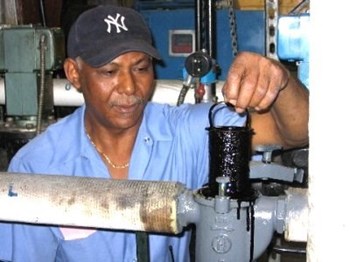
Rodney Dangerfield made a career out of getting no respect, but in the world of condominiums and co-ops, building superintendents may be able to empathize with the comedian. While managing agents and board members seem to get all the accolades when something goes right, supers are usually the ones who maintain the physical structure of the building. They oversee all kinds of repairs and construction projects, as well as helping out individual shareholders with a vast array of minor (and not-so-minor) problems.
But that's not all they do. Their job requirements may also include supervising a support staff of porters, doormen and handymen. As the duties of supers have expanded beyond just fixing leaky pipes and hauling trash to the curb, the issue of licensing and/or certification for supers has become a big part of a discussion among building managers, boards and the supers themselves.
"It's a hot topic," says Margie Russell, executive director of the New York Association of Realty Managers (NYARM). "A lot is happening right now regarding the certification of supers."
According to the experts, a super doesn't necessarily need to get all the licenses and certifications that are available, depending on the type of mechanical equipment in the building, the number of residential units and what the certificate of occupancy (C of O), dictates. However, amassing more credentials could help in career advancement, and aid them in their everyday work.
The Importance of Education
When it comes to the amount of education one needs to be a super in New York City, anything beyond the minimum requirements required by law is up to the person doing the hiring. Each superintendent position requires a different level of experience depending on the size and scope of the job. That doesn't mean that people won't look at an applicant's experience and education though.
"Larger buildings with more sophisticated systems may require some formal education as well as computer knowledge and special certifications from the FDNY, EPA, or HPD," says Julie Karant, communications manager for SEIU Local 32BJ, the service worker's union that represents building supers, doormen, porters, maintenance workers, window cleaners and security guards, among other professionals. "The management company typically determines what exactly they are looking for in each of these respects."
According to Karant, there is no set criteria that applies citywide when setting the bar on what type of qualifications a super needs.
"However, for certain requirements, like fire safety director, standpipe and sprinkler and cooling towers, the FDNY and the EPA administer and monitor testing and certification," she says.
"In addition to the fire requirements, there is low pressure boiler certification," says Peter Grech, former president, and now educational coordinator of the New York Superintendents Technical Association (NYSTA). "The DEP sets requirements for residual oil burners and HPD sets requirements for lead law certificates for supers."
That said, there are plenty of examples of people holding the position who are not certified in any way other than the few licenses that are required by law.
Grech has seen this through the years. "I have seen porters promoted to superintendents as well as handymen," he says. "The most important part of hiring someone for a superintendent are people skills. Secondary are the trade skills in carpentry, electrical and HVAC. But with the changing times, most building issues are people-related, from the staff to the residents. Having trade skills when most of the issues are people-related will not help."
It's important that before hiring a superintendent, the board clarifies what the needs of the building are—managerial and administrative, trade or a combination of both. They need to hire someone who can successfully address their most pressing needs.
"Higher-end buildings tend to prefer an experienced superintendent/resident manager with a similar building history, usually with eight to 10 years of experience," says Michael MacGowan, president of the Manhattan Resident Manager's Club. "High emphasis is put on whether his conduct is a good fit for the building and whether he has the intelligence and skill to satisfy the building's needs. He or she should also have a good building operation maintenance track record."
Other buildings will more likely hire more mechanically advanced superintendents with hands-on experience. Overall, it seems one would have a very hard time finding a superintendent position in Manhattan without Manhattan experience.
Why Go Further?
For those supers who want to continue with their education, there are various Local 32BJ union-sponsored programs. Also many superintendent associations have their own programs.
"The Thomas Shortman Training Fund of Local 32BJ offers over 100 courses and seminars to eligible members to help them advance their career in the building service industry," Karant says. "There are also other professional organizations like NYARM that offer other training opportunities and programs at the NYC College of Technology that allow members to gain higher-level technical skills."
The Thomas Shortman Training Fund has instituted its own Superintendent/Resident Manager Diploma Program based on the feedback of both labor and management representatives.
Russell says that NYARM is always willing to help if someone is looking to further their education in the building maintenance field, and that enhancing their credentials and skillset could be important for their futures.
"Completion of this program's series of courses and lectures, along with appropriate on-the-job experience can help members access the next rung on the career ladder," she says.
Certifications don't guarantee anything though. According to MacGowan, you still need to bring other skills and aptitudes to the table.
MacGowan says that since he is an owner he is, "looking for a superintendent who can positively carry my multimillion-dollar operation in a safe and most efficient way. In addition, since [the superintendent] will be living in my building, I would make sure that he or she and the rest of [the] family knows how to be a good neighbor."
"The benefits [of continued training for supers] include buildings getting qualified supers with skills and technical knowledge that aid them in operating the building," Grech says. "The drawback would be that the more requirements and certifications a super has, the higher the pay for the super, thus more salary the building will have to pay."
Pro Certification
So when it comes to certification, there are different things that people look for in terms of educational requirements.
To achieve the HPD certification a super must successfully complete various seminars, coursework and/or training in the following disciplines: Basic Carpentry, Basic Electricity, Basic Plumbing, Carbon Monoxide, Air Pollution Control, Fire Safety, Visual Assessment, Integrated Pest Management, Real Property Ethics, Local Law 1 and Lead Safe Work Practices.
"HPD sets the tests and the standards, but there is no renewal or continuing [education] requirements that I know of." says Grech. "NYSTA is working with HPD to develop a shortcut where experienced superintendents need not go to all the classes. But based on interviews, reference checks and pre- testing, a qualified super only needs to take six short classes to be deemed competent. NYSTA is hoping that HPD will grant us permission for that soon. It would take the burden off HPD and allow qualified supers speedy certifications. It's a win-win."
When it comes to issues of money, supers normally don't have to worry about paying for their certification and educational courses.
"HPD courses are free," says Karant. "Union classes are free…and the union requires owners to pay for certification."
According to Grech, NYSTA classes have a modest fee, and if a person cannot afford to take the classes, NYSTA will either float the entire class or up to 90 percent of it. One would have to check with their accountant, but most likely the classes would meet IRS regulations as a deduction. Some superintendent associations use membership fees to present programs to enhance member knowledge. Additionally, some are looking to provide certification training for their members, NYSTA, in particular.
Final Thoughts
Remember, a superintendent is as important to a building as just about anyone and finding a good one is vital to a building's success.
"Most people cannot understand the far-reaching responsibilities of a super," MacGowan says. "They think he is just a guy who fixes things. In fact, a super is responsible to a degree for the health, security and welfare of the residents, as well as responsible for the standard of living within the building. Thus a super can make or break a building."
Keith Loria is a freelance writer and a frequent contributor to The Cooperator.






4 Comments
Leave a Comment